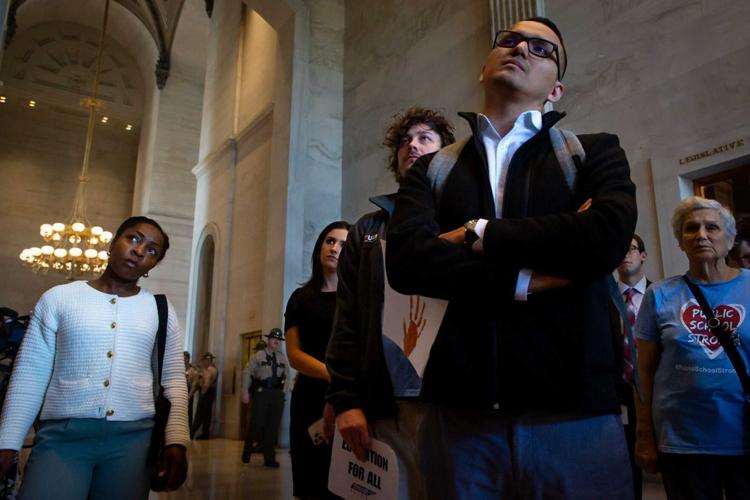Following several weeks of heated protest and committee debates, a bill that would limit undocumented students’ access to public education passed in the Senate this week. Meanwhile, bills on immigration, reproductive health and higher education were the topic of discussion at the Capitol.
Immigration
The Republican-led House Bill 793/Senate Bill 836 passed the Senate 19-13 on April 10 with several Republicans crossing party lines to vote against the legislation.
Bill moves toward final House committee next week
The bill would allow local school boards in Tennessee to deny enrollment or charge tuition to children who cannot provide documents that establish their legal immigration status.
The bill has been the subject of numerous protests during this session, with its opponents calling it unconstitutional and contradictory to a 43-year-old U.S. Supreme Court ruling that ensures the right to public education to all students. It will be heard in its final House committee on April 14. If it becomes law, the legislation would make Tennessee the first state to pass a bill restricting undocumented students from public schools.
Another bill targeting immigrants is headed to the governor’s desk. HB 749/SB 1086 will invalidate out-of-state driver’s licenses issued to undocumented immigrants, making it a class-B misdemeanor to use such licenses.
Grocery Tax Discussion Stalled
Lawmakers did not take action on a bill to lower taxes on groceries (HB0021/SB1367) this week, moving it instead to be discussed after the budget and potentially killing it for this year.
Rep. Elaine Davis (R-Knoxville) sponsors the bill in the House and presented an amended version to the Finance, Ways and Means Subcommittee on Wednesday. The bill would remove the state portion of the sales tax on food. The bill had a large fiscal note attached originally, Davis said, spurring her to include an amendment that would deal with only certain items. That amendment states the sales tax would be removed on items such as milk, bread, eggs, butter, cheese, fruits and vegetables.
“I know that we live in some challenging financial times right now,” Davis said. “But we can always look to serve our communities and serve every Tennessean for them to be able to provide for their families. And for those individuals that are not on any sort of assistance programs, that are the working poor or that are on a fixed income, they deserve that relief, and so we want to try to help them in any way that we can.”
Another amendment on the bill, Davis said, was brought to her by the University of Tennessee, which through its agriculture extension program can grow crops and sell them. Currently sales tax is collected on those items, and the university requested that the tax be removed.
Republicans and Democrats are discussing potential changes to their own versions of budget amendments. This bill and others could be included in those changes. The budget bills are set to be heard in committee Monday, so any amendments will likely be made public at that time.
IVF, Contraception Access Codified
Contraception protections tabled, physicians denied testimony in final Public Health Committee meeting
The rights to access fertility treatments and contraceptives and for health care providers to give such care will soon be codified in the state of Tennessee, with a bill on its way to the governor’s desk after passing the House on Thursday. The Fertility Treatment and Contraceptive Protection Act was brought by Sen. Becky Massey (R-Knoxville) and Rep. Iris Rudder (R-Winchester) and saw bipartisan support.
Earlier in the session, a bill involving IVF that would have, in part, limited genetic testing of embryos met its demise. Similarly, HB 14 from Rep. Harold Love (D-Nashville) sought to clarify that "criminal abortion" under Tennessee’s abortion ban does not include the use of contraceptives or the disposal of embryos from IVF, but that too failed earlier this year. A bill from Rep. Gloria Johnson (D-Knoxville) seeking to enshrine the right to contraception in Tennessee also failed for the second year.
Abortion Pill Penalties Strengthened
A bill from Rep. Gino Bulso (R-Brentwood) and Sen. Joey Hensley (R-Hohenwald) that would increase the penalty against those who distribute mifepristone for the purpose of a medication abortion passed the Senate this week. Creating a new “catastrophic loss” claim, those distributors can be fined up to $2 million.
House scheduled to vote on proposal Thursday
As it stands, Tennesseans can order the drug in the mail, despite past attempts from the legislature to ban that capability. Mifepristone can be used in pregnancies at fewer than 70 days’ gestation, and it accounted for nearly two-thirds of abortions in 2023, but the drug is also used in hospitals during miscarriages.
A bill on its way to Gov. Bill Lee’s desk would allow health care workers to deny patients care when said care violates their “conscience,” a move that could put Tennessee law at odds with ethical standards adopted by professional medical organizations.
The bill was written by the Alliance Defending Freedom, a conservative Christian legal advocacy group that has also advocated for legislation limiting abortions and gay marriage and targeting transgender people.
Menstrual Hygiene Products
Legislation that would have exempted menstrual hygiene products from a sales tax was deferred until 2026. If the tax was eliminated, the state could potentially lose out on more than $18 million in revenue, and local governments could see a more than $7 million loss.
This comes as the Menstrual Hygiene Products Accessibility Act is set to be heard before the House Finance, Ways and Means Subcommittee on April 14. The bill would require public schools to provide free menstrual hygiene products in all women’s and girls’ bathrooms and locker rooms and with school nurses.










